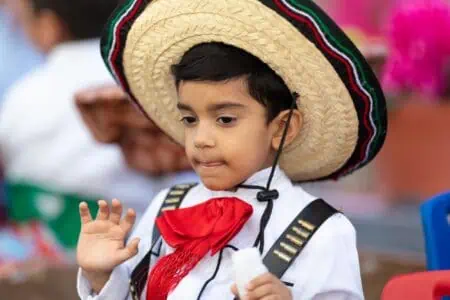Mexican boy names are sometimes lost under the mantle of Spanish or Hispanic culture. They include some very popular traditional names, plus tons of unique, even manly, selections for your little guy. How do you settle on the perfect name, honoring Mexican history that works in the modern world?
Here you’ll find entertaining stories of the coolest Mexican boy names that take into account pronunciation, variations, and famous namesakes. You’ll make your number one niño a happy one.
100 Popular Mexican Names for Boys
Take a trip to Mexico with unforgettable Mexican boy names that stand the test of time.
Ahulan
In Mayan mythology, Ahulan was an archer god with an arrow ready to be fired. When appearing as Ahulani in Hawaiian, it means “heavenly shrine.”
- Origin: Mexican, Mayan
- Meaning: Archer god
- Pronunciation: AAH-huw-Laan
- Variations: Ahuln, Ahulane
- Popularity: Ahulan is extremely rare worldwide, with just one known occurrence in 2014 in India.
Aitor
Aitor is rare among Hispanic boy names due to its Basque origins. It’s made up of the Basque “aita,” meaning “father,” and “on,” meaning “good.” Aitor is the famous founder of the Basque people, created by the writer Agosti Xaho.
- Origin: Mexican, Basque
- Meaning: Good father
- Pronunciation: AEY-tor
- Namesakes: Aitor López Rekarte, a Spanish footballer for Real Sociedad. Aitor González, a Spanish road bicycle racer who won the 2002 Vuelta a España.
- Popularity: Aitor is extremely rare worldwide, with 49 known occurrences in 2014, mostly in Spain.
Alejandro
Alejandro is the Spanish version of Alexander, meaning “defender of man” in Greek. It also means “protector of mankind,” which gives your little guy a big task to accomplish in life.
- Origin: Mexican, Greek
- Meaning: Warrior
- Pronunciation: Ael-ley-HHAN-Drow
- Variations: Alehandro
- Namesakes: Alejandro González Iñárritu, a Mexican filmmaker known for Birdman (2014). Alejandro M. SInibaldi, the acting President of Guatemala from April 2 to April 5, 1885.
- Popularity: Alejandro ranked 300th worldwide and is mainly used in Mexico, where it ranked 19th in 2014.
Alfonso
Alfonso is an elegant reminder of Spanish kings derived from the Germanic Adelfonsus, meaning “battle ready.” Alfonso was first used in the 8th-century for the King of Asturias.
- Origin: Mexican, Italian
- Meaning: Noble, ready
- Pronunciation: AhL-FAON-sow
- Variations: Alphonso, Alfonse
- Namesakes: Alfonso I, the Spanish King of Aragon and Navarre from 1104 to 1134. Alfonso Cuarón Orozco, a Mexican filmmaker who directed Great Expectations (1998).
- Popularity: Alfonso ranked 1,083rd worldwide, is primarily used in Mexico, and ranked 87th in Colombia in 2014.
Alonzo
Alonzo also means “ready for battle.” It became a top name during the 19th-century in Spain as a variation of Alphonze, which made it to Mexico.
- Origin: Mexican, German
- Meaning: Noble
- Pronunciation: Ah-LAAN-Zow
- Variations: Allonzo, Alonso
- Namesakes: Alonzo B. Cornell, the 27th Governor of New York from 1880 to 1882. Alonzo Lawrence, an American football player for the Edmonton Eskimos.
- Popularity: Alonzo is rare worldwide and mostly used in the U.S., where it ranked 744th for boys in 2023.
Álvaro
Though a Spanish name, Álvaro takes inspiration from the Old Norse Alfarr, meaning “elf army.” It also means “guardian” and was used by many Spanish saints.
- Origin: Spanish
- Meaning: Elf warrior
- Pronunciation: AHL-vah-Row
- Namesakes: Álvaro López, a British drummer for the English band Second Person. Álvaro Navarro Serra, a Spanish pilota player and member of the Valencian Pilota Squad.
- Popularity: Álvaro is rare worldwide, mainly used in Mexico, and ranked 478th in Angola in 2014.
Amadis
Amadis means “lover of God” in Latin and is the Spanish equivalent of the Germanic Amadeus. The Latin root “amor” stands for “love,” perfectly suited to the Amadís de Gaula, a famous Spanish chivalric romance.
- Origin: Mexican, Latin
- Meaning: God’s love
- Pronunciation: Ah-maa-DIHS
- Popularity: Amadis is very rare worldwide and primarily used in Colombia.
Amor
Amor is the name of the Roman god of love. Amor comes from the Latin “amor,” meaning ‘love,” and is an old-fashioned way to express it to your little one.
- Origin: Mexican, French
- Meaning: Love
- Pronunciation: Ah-MOR
- Namesakes: Amor P. Deloso, the governor of Zambales, Philippines from 2016 until 2019. Amor De Cosmos (born William Smith), the second premier of British Columbia from 1872 to 1874.
- Popularity: Amor is rare worldwide and mostly used in Algeria and South Sudan, ranking 155th in 2014.
Andrés
Andrés is the Spanish form of Andrew and is one of many Mexican names for boys originating in Greek. Andreas became Andrés and is now joined by modern names like Andre and Andrea.
- Origin: Mexican, Greek
- Meaning: Warrior
- Pronunciation: AHN-Dreyz
- Variations: Andrez
- Namesakes: Andrés Indriðason, an Icelandic TV producer for the channel Sjónvarpið. Andrés Velencoso, a Spanish model known for a Louis Vuitton campaign with Jennifer Lopez in 2003.
- Popularity: Andrés ranked 565th worldwide, is mainly used in Mexico, and ranked 44th in Venezuela in 2014.
Ángel
The Greek Angelos means “messenger,” another word for an “angel.” Angelus is the medieval Latin version, meaning “one who announces.”
- Origin: Mexican, Greek
- Meaning: Messenger
- Pronunciation: EYN-Jhahl
- Variations: Anjel
- Namesakes: Ángel Matías, a Puerto Rican volleyball player who competed at the 2007 Pan-American Cup. Ángel Galarza, the Spanish Minister of the Interior from 1936 to 1937.
- Popularity: Ángel ranked 203rd worldwide, is primarily used in Mexico, and ranked 9th in Ecuador in 2014.
Antonio
Antonio is the Spanish and Italian variation of Antonius. It’s associated with the Greek Anteon, the son of Hercules. Antonio means “of the Antonius family” in ancient Rome and is incredibly popular among Mexican male names today.
- Origin: Mexican, Spanish
- Meaning: Flourishing
- Pronunciation: Aen-TOW-niy-Ow
- Variations: Anthonio, Antoinio
- Namesakes: Antonio Fogazzaro, an Italian novelist nominated for the Nobel Prize in Literature seven times. Antonio Sánchez, a Puerto Rican TV host of No te Duermas.
- Popularity: Antonio ranked 28th worldwide and is mostly used in Brazil, where it ranked 4th in 2014.
Ariel
Ariel derives from the Hebrew “Av’-re-el,” meaning “the light of God.” It’s also a word for “hero,” “hearth,” and a name for Jerusalem. Ariel usually appears as Arielle for girls, but Ariel is mostly given to boys.
- Origin: Mexican, Hebrew
- Meaning: Lion of God
- Pronunciation: AER-iy-Ahl
- Variations: Arel, Ariele
- Namesakes: Ariel Sharon, the 11th Prime Minister of Israel from 2001 to 2006. Ariel Pestano, a Cuban baseball player on Cuba’s World Baseball Classic team in 2006 and 2009.
- Popularity: Ariel ranked 1,734th worldwide and is mainly used in the Philippines, ranking 55th in 2014.
Armando
Armando also means “armed man.” Any definition that concerns the army, like “of the army” or “army man,” fits Armando well.
- Origin: Mexican, Latin
- Meaning: Soldier
- Pronunciation: Ar-MAAN-dow
- Variations: Armondo
- Namesakes: Armando Iannucci, a Scottish TV producer and co-creator of Steve Coogan’s character Alan Partridge. Armando Guevara, a Venezuelan boxer and bronze medalist at the 1978 World Amateur Boxing Championships.
- Popularity: Armando ranked 470th worldwide, is primarily used in Mexico, and ranked 699th for boys in the U.S. in 2022.
Arturo
Arturo is a common Spanish variation of Arthur composed of the Celtic “artos,” meaning “bear” and “úr,” meaning ‘“pure.” Your baby boy will officially be as “strong as a bear” anytime he wants.
- Origin: Mexican, Italian
- Meaning: Bear
- Pronunciation: Ar-TUW-row
- Variations: Arthuro
- Namesakes: Arturo Frondizi, the President of Argentina from 1958 to 1962. Arturo Pérez-Reverte, a Spanish war correspondent for RTVE.
- Popularity: Arturo ranked 938th worldwide and is mostly used in Mexico, where it ranked 42nd in 2014.
Balam
Balam is one of the badass Mexican boy names with indigenous beginnings that’s Mayan for “jaguar.” Balam means something quite different in Arabic (“jolly”) and Hindi (“husband”).
- Origin: Mexican, Mayan
- Meaning: Jaguar
- Pronunciation: BAA-laam
- Variations: B’alam, Balaam
- Namesakes: Kazi Md. Ali Jahangir (known as Balam), a Bangladeshi musician and lead vocalist for the band Warfaze.
- Popularity: Balam is rare worldwide and mainly used in India.
Balbino
Balbino is another version of the Latin Balbo given to someone who is “inarticulate.” It’s also a nickname for a “mutterer,” as a Hindi boy’s name.
- Origin: Mexican, Latin
- Meaning: Mutterer
- Pronunciation: Baal-BIY-now
- Variations: Balbo
- Namesakes: José Balbino da Silva (known as Balbino), a Portuguese footballer for FC Porto. Anderson Balbino (known as Balbino), a Brazilian footballer for Al-Qasim.
- Popularity: Balbino is rare worldwide, primarily used in Brazil, and ranked 726th in Paraguay in 2014.
Belén
Belén is also the Greek word for “arrow.” It’s the Spanish name for Bethlehem, meaning “house of bread.” Belén is used more for girls but is officially gender-neutral.
- Origin: Mexican, Spanish
- Meaning: Jerusalem
- Pronunciation: BEH-lehn
- Popularity: Belén is rare worldwide, mostly used in the Philippines, and ranked 200th in Spain in 2014.
Benito
Benito is the Spanish form of the Latin Benedict, meaning “blessed.” It may be associated with the Italian dictator Benito Mussolini, but your little Benny can use the Spanish nickname Beno to stand out.
- Origin: Mexican, Italian
- Meaning: Blessed
- Pronunciation: Beh-NIY-tow
- Variations: Benitto
- Namesakes: Benito Mussolini, an Italian dictator and the Prime Minister of Italy from 1922 to 1943. Benito Villegas, the first Champion of Club Argentino de Ajedrez between 1906 and 1907.
- Popularity: Benito is rare worldwide and mainly used in Mexico, ranking 190th in 2014.
Braulio
Braulio is an obscure Spanish name meaning “shining” and “torch.” It’s associated with the German “brahuila,” meaning “bright,” and “brandaz,” meaning “flaming sword.”
- Origin: Mexican, German
- Meaning: Fire
- Pronunciation: BRAW-liy-Ow
- Variations: Brauleo, Brauliyo
- Namesakes: Bráulio Barbosa de Lima, a Brazilian footballer for Internacional. Braulio García, a Spanish singer-songwriter who competed in the Eurovision Song Contest 1976.
- Popularity: Braulio is rare worldwide, primarily used in Mexico, and ranked 399th in Chile in 2014.
Calixto
Calixto originated with the Greek Kallistos, given to the “most beautiful” person. Calixto is famous as the name of Spanish popes like Saint Calixtus I.
- Origin: Mexican, Greek
- Meaning: Most beautiful
- Pronunciation: Kaa-LIYKS-tow
- Namesakes: Calixto García, a Cuban general in the 1895 Cuban War for Independence. Calixto Zaldivar, a Filipino Supreme Court Justice from 1964 to 1974.
- Popularity: Calixto is rare worldwide, mostly used in Mexico, and ranked 448th in Cuba in 2014.
Carlos
Carlos is a traditional Spanish name equivalent to Charles. It’s taken from the Germanic “karal,” meaning “free man.” Carlos has ranked in the top 10 U.S. boys’ names since 2000.
- Origin: Mexican, German
- Meaning: Valiant
- Pronunciation: KAAR-Lows
- Variations: Carlo, Charlos
- Namesakes: Carlos Castañeda, an American writer best known for The Teachings of Don Juan in 1968. Carlos Lezcano, a Puerto Rican baseball player for the Chicago Cubs.
- Popularity: Carlos ranked 26th worldwide, is mainly used in Brazil, and ranked 224th for boys in the U.S. in 2023.
Casimiro
Casimiro may be a Slavic name that means “proclaimer of peace,” but it began as Casimir. It’s also a surname found in Spanish and Portuguese cultures.
- Origin: Mexican, Slavic
- Meaning: Peaceful
- Pronunciation: Kaas-iy-MIY-Row
- Variations: Casimir
- Namesakes: Casimiro Andrada, the 5th Municipal President of Balasan, Philippines, from 1911 to 1913. Casimiro Torres, a Chilean footballer for Chile in the 1930 FIFA World Cup.
- Popularity: Casimiro is rare worldwide and primarily used in Mozambique, where it ranked 350th in 2014.
Cedro
Cedro may read funny, but it’s a short version of Isadoro and Cedric. It means “love” but sounds similar to Cedrela odorata, a Spanish cedar tree.
- Origin: Mexican, Spanish
- Meaning: Love
- Pronunciation: SED-droh
- Variations: Cidro
- Popularity: Cedro is very rare worldwide and mostly used in the U.S.
Celio
Celio may derive from the Latin Cölestin or be a gangster form of Cecil. Celio is also the name of the 19th rione (region) of Rome.
- Origin: Mexican, Latin
- Meaning: Heavenly
- Pronunciation: SEHL-yow
- Namesakes: Celio Roncancio, a Colombian road racing cyclist who came first in the 1996 Colombia National Championships. Célio Silva, a Brazilian footballer for Vasco da Gama.
- Popularity: Celio is rare worldwide, mainly used in Brazil, and ranked 260th in Mozambique in 2014.
César
César is the product of the ancient Roman title Caesar, referring to an emperor. Nowadays, César means “hair” and “head of hair.”
- Origin: Mexican, Latin
- Meaning: Head of hair
- Pronunciation: SEY-saar
- Variations: Caesar, Ceaser
- Namesakes: Cesar Chavez, an American civil rights activist who co-founded the National Farm Workers Association. César Cedeño, a Dominican baseball player for the Houston Astros.
- Popularity: César ranked 333rd worldwide, is mostly used in Mexico, and ranked 14th in Peru in 2014.
Charro
Charro is the Latino nickname for a cowboy, particularly in Argentina. There’s a long tradition of Mexican horse riders who wear hats called “sombrero de charro” while wrangling horses.
- Origin: Mexican, Spanish
- Meaning: Cowboy
- Pronunciation: CHAR-oh
- Variations: Charo
- Popularity: Charro is very rare worldwide and primarily used in the Philippines.
Ciro
Ciro is the Spanish equivalent to Cyrus and means “lord” when based on the Greek “kýrios.” Ciro can be an awesome middle name for your lad, meaning “throne.”
- Origin: Mexican, Italian
- Meaning: Sun
- Pronunciation: SIY-Row
- Namesakes: Ciro Procuna, a Mexican sports announcer for ESPN Deportes in the U.S. Ciro Rodriguez, a U.S. Representative for Texas from 2007 to 2011.
- Popularity: Ciro is rare worldwide and mostly used in Italy, ranking 163rd in 2014.
Cozumel
In Mayan, Cozumel comes from the words “Ah Cuzamil Peten,” meaning “the island of swallows.” It’s better known as an island in the Caribbean Sea just off Mexico’s Yucatan Peninsula.
- Origin: Mexican, Mayan
- Meaning: Island of swallows
- Pronunciation: KAA-zuh-Mehl
- Popularity: Cozumel is extremely rare worldwide, with just 11 known occurrences in 2014, mainly in Mexico.
Crisanto
Crisanto originated as the Greek Chrysanthos, which inspired the name of the Chrysanthemum flower. Because of its “gold color,” it may inspire you to use it for your golden boy.
- Origin: Mexican, Greek
- Meaning: Gold flower
- Pronunciation: Chriy-SAAHN-tow
- Namesakes: Crisanto Luque Sánchez, a Colombian cardinal and the Archbishop of Bogotá from 1950 to 1959. Crisanto Evangelista, the Filipino Chairman of the Partido Komunista ng Pilipinas from 1930 to 1942.
- Popularity: Cristanto is rare worldwide and primarily used in the Philippines, where it ranked 362nd in 2014.
Daniel
Daniel is made up of the Hebrew “din,” meaning “to judge,” and “el,” meaning “God.” It’s the name for the biblical prophet Daniel, an example of Mexican names for boys with Hebrew origins.
- Origin: Mexican, Hebrew
- Meaning: God is my judge
- Pronunciation: DAEN-Yahl
- Variations: Danyel, Danial
- Namesakes: Daniel Tosh, an American stand-up comedian and host of Comedy Central’s Tosh.0. Daniel Webster, a U.S. House of Representatives member since 2011.
- Popularity: Daniel ranked 24th worldwide and is mainly used in the U.S., ranking 34th for boys in 2023.
David
David first appeared as the Hebrew Dawid, taken from “dod,” meaning “beloved.” David is the legendary second king of Israel, which works for your royal baby boy too.
- Origin: Mexican, Hebrew
- Meaning: Beloved
- Pronunciation: DEY-Vihd
- Variations: Davyd
- Namesakes: David Carradine, an American actor known for the 1970s series Kung Fu. David Fincher, an American filmmaker best known for directing Fight Club (1999).
- Popularity: David ranked 13th worldwide and is primarily used in the U.S., where it ranked 18th for boys in 2023.
Desi
Desi is a nickname from the Latin Desiderio, meaning “sorrow.” Desi is also a word to describe the people and culture of India when taken from the Sanskrit “deśá,” meaning “land” and “country.”
- Origin: Mexican, French
- Meaning: Desired
- Pronunciation: DEHZ-iy
- Variations: Dezi
- Namesakes: Desiderio “Desi” Arnaz, a Cuban-American actor on the sitcom I Love Lucy. Desmonet “Desi” Lydic, an American comedian and correspondent on The Daily Show.
- Popularity: Desi is rare worldwide and mostly used in Indonesia, ranking 67th in 2014.
Diego
Diego may be associated with Tiago, a pet name for Santiago. The other possibility includes the old Spanish Didacus, which transformed into Diaco and Diago in the 10th-century.
- Origin: Mexican, Spanish
- Meaning: Supplanter
- Pronunciation: Diy-EY-gow
- Variations: Dyego
- Namesakes: Diego Luna, a Mexican actor appearing in Rogue One: A Star Wars Story. Diego Rivera, a Mexican painter of murals whose one-time wife was Mexican artist Frida Kahlo.
- Popularity: Diego ranked 461st worldwide, is mainly used in Brazil, and ranked 179th for boys in the U.S. in 2023.
Eberardo
Eberardo has Germanic beginnings but somehow ended up in Mexico. It’s meant for a boy who wishes to be “strong like a boar.”
- Origin: Mexican, German
- Meaning: Courageous
- Pronunciation: Eh-bey-RAAR-Dow
- Variations: Everardo
- Namesakes: Eberardo Villalobos, a Chilean footballer for the Chile national team. Eberardo Pavesi, an Italian road racing cyclist who competed at the 1912 Giro d’Italia.
- Popularity: Eberardo is very rare worldwide and primarily used in Mexico, where it’s slightly uncommon.
Elijah
Elijah dates back to the Hebrew Eliyyahu, meaning “Yahweh is my God.” Yahweh is an ancient Hebrew name for God, along with El, to give as a blessing to your baby boy.
- Origin: Mexican, Hebrew
- Meaning: The Lord is God
- Pronunciation: Ih-LAEY-Jhah
- Variations: Elyjah
- Namesakes: Elijah Amoo Addo, a Ghanaian chef and creator of Food for All Africa. Elijah Wood, an American actor best known for The Lord of the Rings film trilogy (2001 to 2003).
- Popularity: Elijah is rare worldwide, mostly used in Nigeria, and ranked 4th for boys in the U.S. in 2021.
Emiliano
Emiliano comes from the Roman Aemilius, a family name inspired by “aemulus,” meaning “rival.” In the 18th-century, Emiliano became popular in Spain, so it was only a matter of time before reaching Mexico.
- Origin: Mexican, Italian
- Meaning: Rival
- Pronunciation: Eh-MIY-liy-AH-now
- Variations: Emilio
- Namesakes: Emiliano Figueroa, the President of Chile from 1925 to 1927. Emiliano Rodríguez, a Spanish basketball player named one of FIBA’s 50 Greatest Players in 1991.
- Popularity: Emiliano is rare worldwide, mainly used in Mexico, and ranked 311th for boys in the U.S. in 2020.
Ezra
Ezra is a more common variation of the Hebrew Azaryahu, meaning “God helps.” Ezra was a biblical priest who reintroduced the Torah to the Jewish people. It’s also used as a Persian girl’s name.
- Origin: Mexican, Hebrew
- Meaning: Helper
- Pronunciation: EHZ-Rah
- Variations: Esrah
- Namesakes: Ezra Pound, an American poet famous for the epic poem The Cantos. Ezra Butler, the 11th governor of Vermont from 1826 to 1828.
- Popularity: Ezra is rare worldwide, primarily used in Nigeria, and ranked 85th in Israel in 2014.
Facundo
Facundo was first the Latin Facundus, meaning “eloquent.” It’s also ranked in the top 50 names in Chile.
- Origin: Mexican, Latino
- Meaning: Eloquent
- Pronunciation: Faa-KUHN-dow
- Namesakes: Facundo Gómez, a Mexican TV host of the program Depasónico. Facundo Cabral, an Argentine singer known for “No soy de aquí ni soy de allá (“I’m not from here nor there”).
- Popularity: Facundo is rare worldwide and mostly used in Argentina, ranking 292nd in 2014.
Felipe
Felipe was also given to someone “of Philippos” and is a Spanish version of Phillip. It’s made up of “philein,” meaning “to love,” and “hippos,” meaning “horse.”
- Origin: Mexican, Greek
- Meaning: Lover of horses
- Pronunciation: Feh-LIY-peh
- Variations: Filipe, Felipo
- Namesakes: Felipe Ferreira da Cruz (known as Felipe), a Brazilian footballer for Ferroviário. Felipe Paulino, a Dominican-Venezuelan baseball player for the Chicago White Sox.
- Popularity: Felipe ranked 442nd worldwide, is mainly used in Brazil, and ranked 874th for boys in the U.S. in 2021.
Felix
Felix derives from the Latin “felicis,” meaning “lucky.” It’s the name of popes like St. Felix, the apostle. Felix also means “fortunate” and is a constant choice in Africa and the Americas.
- Origin: Mexican, Latin
- Meaning: Happy
- Pronunciation: FIY-Lihks
- Variations: Felyx, Filix
- Namesakes: Felix Unger, an Austrian heart surgeon who performed the first artificial heart transplantation in Europe in 1986. Félix Malloum, the second President of Chad from 1975 to 1978.
- Popularity: Felix ranked 238th worldwide, is primarily used in Nigeria, and ranked 193rd for boys in the U.S. in 2021.
Fernando
Fernando means “daring” and is a cousin to the German Ferdinand. It’s based on “farṍ,” meaning “journey,” and “nand,” meaning “prepared” for any adventure.
- Origin: Mexican, Spanish
- Meaning: Bold voyager
- Pronunciation: Fehr-NAAN-dow
- Variations: Ferdinando
- Namesakes: Fernando Collor de Mello, the 32nd president of Brazil from 1990 to 1992. Fernando Verdasco, a Spanish tennis player who played in the semifinals of the 2009 Australian Open.
- Popularity: Fernando ranked 115th worldwide, is mostly used in Brazil, and ranked 12th in Mozambique in 2014.
Francisco
Francisco is the Spanish variation of Franciscus, sometimes used for someone “from France.” It became the term for a Frenchman, which ranked 296th in the U.S. in 2021.
- Origin: Mexican, Latin
- Meaning: Free man
- Pronunciation: Frahn-SIYS-kow
- Variations: Francesco
- Namesakes: Francisco Franco, a Spanish general and ruler of Spain from 1939 to 1975. Francisco García, a Dominican basketball player for the Houston Rockets.
- Popularity: Francisco ranked 32nd worldwide, is mainly used in Brazil, and ranked 4th in Spain in 2014.
Gabriel
Gabriel also means “hero of God” after the archangel Gabriel in the Bible. Since the early 2000s, Gabriel has ranked in the top 50 boys’ names in the U.S.
- Origin: Mexican, Hebrew
- Meaning: God is my strength
- Pronunciation: Gah-briy-EHL
- Variations: Gabryel, Gaybriel
- Namesakes: Gabriel Gómez, a Panamanian footballer and Panama’s all-time record cap holder. Gabriel García Márquez, a Colombian writer who won the 1982 Nobel Prize in Literature.
- Popularity: Gabriel ranked 144th worldwide, is primarily used in Brazil, and ranked 223rd for boys in the U.S. in 2023.
Gael
Gael means “strong man” in Celtic as an ancient term for an Irishman. It’s a Spanish name that became common in the 2000s in the U.S., where it continues to climb.
- Origin: Mexican, Celtic
- Meaning: Gaelic
- Pronunciation: GEYL
- Variations: Gaele, Gaell, Gaelle
- Namesakes: Gael García Bernal, a Mexican actor known for The Motorcycle Diaries (2004). Gael Margulies, an Israeli footballer for Beitar Tel Aviv Ramla.
- Popularity: Gael is rare worldwide, mostly used in France, and ranked 137th for boys in the U.S. in 2020.
Galo
Galo is a term used for a person from Gaul, the Roman name for France. It also means “rooster” and is the name of two Hispanic saints in history.
- Origin: Mexican, Latin
- Meaning: From Gaul
- Pronunciation: GAA-Low
- Variations: Gallo
- Namesakes: Galo Plaza, the President of Ecuador from 1948 to 1952. Galo Vásquez, an Ecuadorian footballer for Barcelona S.C.
- Popularity: Galo is rare worldwide, mainly used in India, and ranked 909th in Ecuador in 2014.
Gerardo
Gerardo is the Spanish and Italian variation of Gerard. Gerardo became well-known in the medieval period and is a mainstay among Mexican male names.
- Origin: Mexican, German
- Meaning: Spear strength
- Pronunciation: Jheh-RAAR-dow
- Variations: Gerard
- Namesakes: Gerardo Amarilla, the President of the Chamber of Deputies of Uruguay between 2016 and 2017. Gerardo Herrero, a Spanish filmmaker who directed Comanche Territory in 1987.
- Popularity: Gerardo ranked 756th worldwide, is primarily used in Mexico, and ranked 9th in Costa Rica in 2014.
Ginez
Ginez is a Catalan off-shoot of the Spanish Ginés, originating as the Latin Genesius. It’s a name that connotes a “legitimate” person doing well in life.
- Origin: Mexican, Catalan
- Meaning: Well-born
- Pronunciation: Jhih-NEHZ
- Variations: Gines
- Popularity: Ginez is very rare worldwide and mostly used in Brazil.
Gonzalo
Gonzalo first appeared as the Latin Gundisalvus. The 11th-century Galician Saint Gonzalo may have brought this otherwise obscure name into the Spanish bilingual world.
- Origin: Mexican,
- Meaning: Battle, fight
- Pronunciation: Gohn-ZAA-low
- Namesakes: Gonzalo Sorondo, a Uruguayan footballer for Defensor. Gonzalo de la Torre, a Mexican-American musician who won Singer-Songwriter of the Year at the 2010 Los Angeles Music Awards.
- Popularity: Gonzalo ranked 1,956th worldwide, is mainly used in Mexico, and ranked 81st in Uruguay in 2014.
Grimaldo
Grimaldo is made up of the Old German “grīm,” meaning “helmet,” plus “wald,” meaning “rule.” Grimaldo is an Italian and Spanish form of Gregory that’s much more special.
- Origin: Mexican, Spanish
- Meaning: Helmet rule
- Pronunciation: Griy-MAAL-dow
- Variations: Grymaldo
- Namesakes: Grimaldo Canella, a Consul of Genoa and ambassador to the Emir of Morocco in 1169. Grimaldo González, a Peruvian football player who played in the Mexican Primera División.
- Popularity: Grimaldo is rare worldwide and primarily used in Peru, where it ranked 585th in 2014.
Hector
Hector derives from the Greek “ékhein,” meaning “to have” and “restrain.” In Greek mythology, Hector was a Trojan champion killed by Achilles.
- Origin: Mexican, Greek
- Meaning: Holding fast
- Pronunciation: HHEHK-Tahr
- Variations: Hektor
- Namesakes: Héctor Palacio, a Colombian cyclist and winner of the Vuelta a Colombia in 2000. Hector Charlesworth, a Canadian chair of the Canadian Radio Broadcasting Commission from 1932 to 1936.
- Popularity: Hector ranked 240th worldwide, is mostly used in Mexico, and ranked 727th for boys in the U.S. in 2023.
Herman
Herman is based on the Old German Hariman. It dates back to the 8th-century and also means “victory of the people” for your little soldier boy.
- Origin: Mexican, German
- Meaning: Army man
- Pronunciation: HHAHR-Mahn
- Variations: Hermon, Hermann
- Namesakes: Herman Wouk, an American author and winner of the Pulitzer Prize in fiction in 1951. Herman Claudius van Riemsdijk, a Brazilian chess player awarded the FIDE International Master in 1978.
- Popularity: Herman ranked 1,504th worldwide and is mainly used in Indonesia, where it ranked 51st in 2014.
Ignacio
Ignacio is the Spanish form of the Latin Ignatius, itself a unique take on the Roman family name Egnatius. It also means “born from the fire” and “rays of the sun.”
- Origin: Mexican, Spanish
- Meaning: Fiery
- Pronunciation: Iyg-NAA-siy-Ow
- Variations: Ignocio
- Namesakes: Ignacio Arroyo, a Chilean basketball player for Movistar Estudiantes. Ignacio Walker, the Chilean Foreign Minister of Chile from 2004 to 2006.
- Popularity: Ignacio ranked 1,463rd worldwide, is primarily used in Mexico, and ranked 74th in Paraguay in 2014.
Isaiah
Isaiah was born from the Hebrew phrase “yesha’yahu,” meaning “God saves.” It was the name of a biblical prophet and a basketball player who inspires many Isaiahs in the world today.
- Origin: Mexican, Hebrew
- Meaning: God has helped
- Pronunciation: Ay-ZAY-ah
- Variations: Isaish, Isiah
- Namesakes: Isiah Thomas, an American basketball player and a commentator for NBA TV. Isaiah Jackson, an American conductor with the Boston Pro Arte Chamber Orchestra.
- Popularity: Isaiah is rare worldwide, mostly used in Nigeria, and ranked 81st for boys in the U.S. in 2023.
Izan
Izan means “enduring” and “firm” in Hebrew. In Spanish, it sounds like Ethan, but Mexicans pronounce the “z” as it originally appeared.
- Origin: Mexican, Hebrew
- Meaning: Steadfast
- Pronunciation: Ih-ZAHN
- Variations: Isan
- Namesakes: Izan Llunas, a Spanish actor in the Netflix series Luis Miguel. Izan Guevara, a Spanish motorcycle racer who won the Moto3 World Riders’ Championship in 2022.
- Popularity: Izan is rare worldwide, mainly used in Spain, and ranked 744th for boys in the U.S. in 2023.
Jeronimo
Jeronimo is a not-very-typical form of Jerome. It originated with the Greek Hieronymus and became used by Spanish families inspired by Geronimo, a famous Apache leader.
- Origin: Mexico, Italian
- Meaning: Holy name
- Pronunciation: Jheh-ROW-nah-Mow
- Variations: Geronimo
- Namesakes: Jerónimo Saavedra, the Spanish President of the Canary Islands from 1991 to 1993. Jerónimo Morales Neumann, an Argentine footballer for Independiente Rivadavia.
- Popularity: Jeronimo is rare worldwide, primarily used in Mexico, and ranked 319th in Guatemala in 2014.
Jesus
Jesus is an incredibly popular name in the American-Mexican community and ranked 73rd for U.S. boy’s names. It’s come a long way from the Hebrew Yeshua.
- Origin: Mexican, Hebrew
- Meaning: Savior
- Pronunciation: JHIY-Zahs (English), Hay-SOOS (Mexican Spanish)
- Variations: Jessus
- Namesakes: Jesús González, a Spanish footballer for Sham Shui Po. Jesús Alou, a Dominican baseball player with the San Francisco Giants.
- Popularity: Jesus ranked 106th worldwide and is mostly used in Mexico, where it ranked 6th in 2014.
Jorge
Jorge is a Spanish version of George with roots in the Greek Georgios. It also means “farmer” and is very common in Mexico and Central and South America.
- Origin: Mexican, Spanish
- Meaning: Earthworker
- Pronunciation: HHOWR-Hehy
- Namesakes: Jorge Ramos, a Mexican-American journalist called “The Walter Cronkite of Latin America.” Jorge Solís, a Mexican boxer and the Mexican Super Bantamweight Champion.
- Popularity: Jorge ranked 54th worldwide, is mainly used in Mexico, and ranked 5th in Argentina in 2014.
José
Like many Hispanic boy names, José is a variation of a Biblical name, in this case, Joseph. It also means “who pardons” when based on the Hebrew “Yosef.”
- Origin: Mexican, Spanish
- Meaning: God increases
- Pronunciation: How-ZEY
- Namesakes: José L. Ortiz, a Puerto Rican jockey who won the 2017 Belmont Stakes. Pedro José Calderón, the Prime Minister of Peru from September to November 1865.
- Popularity: José ranked 4th worldwide, is primarily used in Brazil, and ranked 1st in Venezuela in 2014.
Juan
Juan is taken from the Hebrew Yochanan, meaning “God is gracious.” It’s a Spanish name based on John, with a history going as far back as the Middle Ages.
- Origin: Mexican, Hebrew
- Meaning: God’s gift
- Pronunciation: HHWAAN
- Variations: Juane
- Namesakes: Juan Pérez, a Spanish handball player and bronze medalist in the 1996 Summer Olympics. Juan Carlos I, the King of Spain, from 1975 to 2014.
- Popularity: Juan ranked 19th worldwide, is mostly used in Mexico, and ranked 2nd in Argentina and Chile in 2014.
Julian
Julian may be the most Latin of Mexican boy names since it’s based on Julianus, a derivative of Julius. It means “downy-bearded.” The Roman god Jupiter was also known as the “sky father.”
- Origin: Mexican, Latin
- Meaning: Youthful
- Pronunciation: JHUWL-Yahn
- Variations: Jullian, Jullien
- Namesakes: Julian Sands, an English actor known for A Room with a View. Julian Holland, an English TV presenter of Later… with Jools Holland since 1992.
- Popularity: Julian ranked 1,085th worldwide, is mainly used in Mexico, and ranked 94th in Peru in 2014.
Julio
Julio means “downy-bearded” and “Jove-like,” referring to the Roman god of the sky and thunder. Great ancient leaders like Julius Caesar were named with this royal and god-like association in mind.
- Origin: Mexican, Latin
- Meaning: Jove’s child
- Pronunciation: HHUW-Lyow
- Namesakes: Julio Acosta García, the 24th President of Costa Rica from 1920 to 1924. Julio Iglesias, a Spanish singer and the most successful Spanish singer in the world.
- Popularity: Julio ranked 192nd worldwide, is primarily used in Mexico, and ranked 12th in Peru in 2014.
Laredo
Though Laredo is a famous Spanish-named town in Texas, its origins are unclear. It may have once meant “sandy, rocky place” or be based on a Basque word meaning “beautiful pastures.”
- Origin: Mexican, Spanish
- Meaning: Granary worker
- Pronunciation: Laa-REY-dow
- Popularity: Laredo is very rare worldwide and mostly used in Indonesia.
Laszio
Laszio is one of the more uncommon Mexican names for boys that gets mistaken for Laszlo in appearance. It means “God is my help” in languages as varied as Spanish, Hebrew, Greek, and Aramaic.
- Origin: Mexican, Spanish
- Meaning: God is my help
- Pronunciation: LAHZ-iy-Oh
- Popularity: Laszio is extremely rare worldwide and mainly used in the U.S.
Leo
Although being the Latin word for “lion,” Leo has been the name of choice for ten popes. It was a medieval nickname for a “lionhearted” man and a short form of Leopold and Leonhard.
- Origin: Mexican, Latin
- Meaning: Lion
- Pronunciation: LIY-ow
- Variations: Leio, Lyo
- Namesakes: Leo Tolstoy, a Russian writer nominated for the Nobel Prize in Literature every year from 1902 to 1906. Leopold “Leo” Chenal, an American football player for the Kansas City Chiefs.
- Popularity: Leo is uncommon worldwide and primarily used in the U.S., ranking 12th for boys in 2023.
Lobo
Lobo was an old nickname for a person with wolf-like characteristics. It’s also a surname used in Galicia, Spain, and Portugal, meaning “wolf.”
- Origin: Mexican, Spanish
- Meaning: Wolf-like
- Pronunciation: LOW-Bow
- Variations: Loboe, Lobow, Lobowe
- Namesakes: Joseph Eubanks (ring name Lobo), an American wrestler inducted into the CZW Hall of Fame in 2004. Lobo Ismail, a Jordanian singer whose 2008 single “One More Night” is in Future Dance Hits (2008).
- Popularity: Lobo is rare worldwide, mostly used in India, and ranked 1,540th in the Ivory Coast.
Lucas
Lucas describes someone “of or belonging to Lucania” in southern Italy. It’s inspired by Luke the Evangelist and has been around since the Middle Ages.
- Origin: Mexican, Greek
- Meaning: Bringer of light
- Pronunciation: LUW-Kahs
- Variations: Lukas
- Namesakes: Lucas Matthysse, an Argentine boxer and the WBA Welterweight Champion in 2018. Lucas Papademos, the 12th Prime Minister of Greece from 2011 to 2012.
- Popularity: Lucas ranked 391st worldwide, is mainly used in Brazil, and ranked 8th for boys in the U.S. in 2020.
Luis
Luis is the Spanish version of Louis and appeared as a top 100 U.S. boy’s name yearly from 1980 to 2014. It’s ranked 153rd in 2023, so this traditional “famous warrior” isn’t going anywhere.
- Origin: Mexican, Spanish
- Meaning: Famous warrior
- Pronunciation: Luw-IYZ
- Variations: Llius
- Namesakes: Luis Guzmán, a Puerto Rican actor appearing in Out of Sight (1998). Luis Somoza Debayle, the 26th President of Nicaragua from 1956 to 1963.
- Popularity: Luis ranked 25th worldwide and is primarily used in Columbia, ranking 3rd in 2014.
Manuel
Manuel is a more casual adaptation of Immanual and Emmanuel. It’s been common for Spanish-speaking royals and world leaders since the 12th-century and remains popular in Spain today.
- Origin: Mexican,
- Meaning: God is with us
- Pronunciation: Maan-WEHL
- Variations: Manuell, Mannuel
- Namesakes: Manuel Morales, a Peruvian basketball player for the Regatas Lima. Manuel Sosa, the president of the Belize Court of Appeal from 2011 to 2020.
- Popularity: Manuel ranked 62nd worldwide, is mostly used in Mexico, and ranked 3rd in Angola in 2014.
Marco
Marco is the most Italian equivalent of Mark and means “dedicated to Mars,” the Roman God of war. It may be associated with the Latin “mas,” meaning “male” for your baby warrior.
- Origin: Mexican, Italian
- Meaning: War-like
- Pronunciation: MAAR-Kow
- Variations: Marko, Marcko
- Namesakes: Marco Morales, a Filipino actor in the film My Best Friend’s Girlfriend. Marco Werner, a German car racer and winner of 24 Hours of Le Mans in 2005.
- Popularity: Marco ranked 225th worldwide and is mainly used in Italy, where it ranked 18th in 2014.
Martez
Martez is a stand-out name in honor of the Roman god Mars. The god of war inspired this Spanish version of Martin like no other.
- Origin: Mexican, Latin
- Meaning: From the God Mars
- Pronunciation: MAAR-Tehz
- Variations: Martes
- Namesakes: Martez Ivey, an American football player for the Edmonton Elks. Martez Wilson, an American football player for the New Orleans Saints.
- Popularity: Martez is very rare worldwide and primarily used in the U.S., where it ranked 663rd for boys in 2023.
Mateo
Mateo is a more interesting variation of Matthew, which originated as one of Jesus’s disciples in the Hebrew Bible. It’s used in Mediterranean, Italian, and Spanish-based countries, including Mexico.
- Origin: Mexican, Spanish
- Meaning: Gift of God
- Pronunciation: Mah-TEY-oh
- Variations: Matteo
- Namesakes: Mateo Bertoša, a Croatian footballer for Opatija. Mateo Chiarino, a Uruguayan actor appearing in the film Hawaii (2013).
- Popularity: Mateo is rare worldwide, mostly used in Mexico, and ranked 77th in Guatemala in 2014.
Maximo
Maximo may be the French equivalent of the Latin Maximus, but it’s become quite a tradition in places like Peru, especially once the film Gladiator came out.
- Origin: Mexican, Latin
- Meaning: Greatest
- Pronunciation: MAEKS-iy-Mow
- Namesakes: Maximo Lorenzo, an American comic book artist known for illustrating “Hellbender.” Maximo Blanco, a Venezuelan mixed martial artist and former Lightweight King of Pancrase.
- Popularity: Maximo is uncommon worldwide and mainly used in Peru, ranking 74th in 2014.
Miguel
Miguel comes from the Hebrew Mika’el. Miguel is the Spanish and Portuguese form of Michael, spelled as Miquel in Catalan.
- Origin: Mexican, Hebrew
- Meaning: Who is like God
- Pronunciation: Miy-GEHL
- Namesakes: Miguel Galván, a Mexican actor appearing on the series La Hora Pico. Miguel Ponce, a Chilean football manager for Deportes Iquique.
- Popularity: Miguel ranked 67th worldwide, is primarily used in Mexico, and ranked 77th for boys in the U.S. in 2020.
Montezuma
Montezuma is the name of a deity in the folklore of the Amerindian tribes in the southwestern U.S., and versions of it have been used by famous Aztec Emperors throughout history.
- Origin: Mexican, Aztec
- Meaning: Lord frowns in anger
- Pronunciation: Maan-teh-ZUW-Mah
- Variations: Moctezuma
- Namesakes: Montezuma Fuller, an American architect with buildings listed in the U.S. National Register of Historic Places.
- Popularity: Montezuma is extremely rare worldwide, with 66 known occurrences in 2014, mostly in Brazil.
Nemesio
Nemesio also means “he who gives justice fairly.” In Greek mythology, Nemesis was the goddess of revenge who was an example of the anger of the gods.
- Origin: Mexican, Spanish
- Meaning: Justice
- Pronunciation: Ney-MEY-siy-Ow
- Variations: Nemeseo, Nemesiyo
- Namesakes: Nemesio Jiménez, a Spanish cyclist who competed at the 1968 Summer Olympics. Nemesio Domínguez Domínguez, the Deputy of the LX Legislature of the Mexican Congress from 2006 to 2009.
- Popularity: Nemesio is rare worldwide, mainly used in the Philippines, and ranked 698th in Peru in 2014.
Octavio
Octavio derives from the Latin “octavus,” meaning “eighth.” Octavius was a Roman family name now favored by Mexican parents, while it’s also a surname in the Philippines.
- Origin: Mexican, Latin
- Meaning: Eighth
- Pronunciation: Ahk-TAA-viy-Ow
- Variations: Octovio
- Namesakes: Octavio Paz, a Mexican poet and winner of the 1990 Nobel Prize in Literature. Octavio Dotel, a Dominican baseball player for the Detroit Tigers.
- Popularity: Octavio is uncommon worldwide, primarily used in Mexico, and ranked 219th in Colombia in 2014.
Onofre
Onofre is also a surname meaning “peacekeeper” in Spanish or Italian. Onofre is also a scientific word for the family of Brazilian jumping spiders from the Amazon – so beware of your little Onofre!
- Origin: Mexican, Spanish
- Meaning: Peace warrior
- Pronunciation: Ow-NOW-frey
- Variations: Onofrio
- Namesakes: Onofre Corpuz, the 13th president of the University of the Philippines System from 1975 to 1979. Onofre Abellanosa, a Filipino-Visayan writer of the short story Ang Kagabhion in 1946.
- Popularity: Onofre is rare worldwide, mostly used in Brazil, and ranked 937th in Guatemala in 2014.
Oscar
Oscar has a variety of meanings, like the Gaelic “deer-lover” and “champion warrior.” It may be even more popular in the U.S. than in Latino countries.
- Origin: Mexican, Irish
- Meaning: God-spear
- Pronunciation: AAS-Kahr
- Variations: Osckar, Oszcar
- Namesakes: Óscar Isaac, a Guatemalan-American actor named the best actor of his generation by Vanity Fair in 2017.
- Popularity: Oscar ranked 170th worldwide, is mainly used in Mexico, and ranked 302nd for boys in the U.S. in 2023.
Pancho
Pancho is the last nickname you’d expect, as the Spanish diminutive for Francisco. If you want to honor the famous Mexican revolutionary Pancho Villa with this rare but cool name, take a shot at Pancho.
- Origin: Mexican, Spanish
- Meaning: Free
- Pronunciation: PAENCH-ow
- Namesakes: Francisco “Pancho” Villa, a general in the Mexican Revolution. Pancho Vladigerov, a Bulgarian composer and a founding member of the Bulgarian Contemporary Music Society (1933).
- Popularity: Pancho is rare worldwide, primarily used in India, and ranked 738th in Bulgaria in 2014.
Pascual
Pascual also means “born on Easter day.” It’s based on the Latin “pascha,” meaning “Easter,” to celebrate the holiday that is your baby boy’s birth.
- Origin: Mexican, Latin
- Meaning: Relating to Easter
- Pronunciation: Pahs-KWAHL
- Variations: Pasqual, Pasquale
- Namesakes: Pascual Madoz, Spain’s Prime Minister from September to October 1868. Pascual Romero, an American musician who co-hosts the Squaring the Strange podcast.
- Popularity: Pascual is rare worldwide, mostly used in Mexico, and ranked 271st in Guatemala in 2014.
Pedro
Pedro is the Spanish form of Peter, which came out of the Latin Petrus, meaning “stone.” Pedro is as popular as Peter can often be in English-speaking countries.
- Origin: Mexican, Spanish
- Meaning: Rock
- Pronunciation: PEH-Drow
- Namesakes: Pedro Almodóvar, a Spanish filmmaker known for Women on the Verge of a Nervous Breakdown (1988). Pedro Lascuráin, the 38th President of Mexico, for less than one hour on February 19, 1913.
- Popularity: Pedro ranked 50th worldwide, is mainly used in Brazil, and ranked 3rd in Portugal in 2014.
Rafael
Rafael is the Spanish spelling of the Hebrew Raphael. It first appeared as Rafa’el, meaning “God has healed,” as the name of the seven archangels.
- Origin: Mexican, Spanish
- Meaning: God has restored
- Pronunciation: Raa-faa-EHL
- Variations: Raphael
- Namesakes: Rafael Araneda, a Chilean TV presenter and host of Rojo Fama Contrafama. Rafael Ramos, a Puerto Rican boxer and gold medalist at the Pan American Games.
- Popularity: Rafael ranked 151st worldwide, is primarily used in Brazil, and ranked 113th for boys in the U.S. in 2020.
Ramiro
Ramiro also means “renowned counselor.” It’s used in Spanish-speaking cultures as an equivalent to the Latin Ramirus. Ramiro was used by several medieval kings in what is modern-day Portugal.
- Origin: Mexican, German
- Meaning: Good judge
- Pronunciation: Raa-MIHR-ow
- Variations: Rameero, Ramyro
- Namesakes: Ramiro Mendoza, a Panamanian baseball player for the New York Yankees. Ramiro Saavedra, a Peruvian singer and winner of the Yo soy (I Am) reality series.
- Popularity: Ramiro is uncommon worldwide, mostly used in Mexico, and ranked 62nd in Bolivia in 2014.
Raul
Raul is used in France, but this spelling is quite popular among Mexican male names that choose it over Raoul. It takes inspiration from the German Rudolph and simply means “wolf.”
- Origin: Mexican, German
- Meaning: Wolf counsel
- Pronunciation: Rae-UWL
- Variations: Raoul
- Namesakes: Raul Renter, the winner of the Estonian Chess Championship twice. Raúl Alfonsín, the President of Argentina from 1983 to 1989.
- Popularity: Raul ranked 293rd worldwide, is mainly used in Mexico, and ranked 17th in Cuba in 2014.
Rico
Rico is a lesser-known nickname for Federico, Enrico, and even Ricardo. It also means “brave ruler,” and if that isn’t enough, it’s one of the cutest names around.
- Origin: Mexican, Spanish
- Meaning: Dominant ruler
- Pronunciation: RIY-Kow
- Variations: Ricco, Riko
- Namesakes: Rico Hizon, a Filipino senior anchor for CNN Philippines. Rico Krahnert, a German figure skater and the 1988 Golden Spin of Zagreb champion.
- Popularity: Rico is rare worldwide and primarily used in the Philippines, where it ranked 306th in 2014.
Rigoberto
Rigoberto came out of the Germanic Richbert. Rigoberto may be relatively unknown in the U.S., but it’s prevalent in Mexico and is the name of a 1945 Argentine comedy film.
- Origin: Mexican, Spanish
- Meaning: Rule bright
- Pronunciation: Riy-gow-BEYR-Tow
- Variations: Regoberto, Rygoberto
- Namesakes: Rigoberto Riasco, a Panamanian boxer and the WBC Super Bantamweight Champion in 1976. Rigoberto González González, a senator of the LIX Legislature of the Mexican Congress since 2006.
- Popularity: Rigoberto is uncommon worldwide, mostly used in Mexico, and ranked 78th in Honduras in 2014.
Roberto
Roberto means “shining glory” when based on the Old German “hruod,” meaning “glory” and “beraht,” meaning “bright.” It’s one of the most tried-and-true examples of Mexican boy names.
- Origin: Mexican, German
- Meaning: Bright fame
- Pronunciation: Row-BEHR-tow
- Namesakes: Roberto Benigni, an Italian actor/filmmaker known for Life Is Beautiful (1997). Roberto Sosa, an Argentine footballer for Udinese.
- Popularity: Roberto ranked 99th worldwide, is mainly used in Mexico, and ranked 3rd in Cuba in 2014.
Romeo
Romeo originally referred to someone “from Rome,” which used the Latin Rōmaeus, meaning “pilgrim to Rome.” It’s likely best known as the tragic hero in Shakespeare’s Romeo and Juliet for dramatic little boys like yours.
- Origin: Mexican, Latin
- Meaning: From Rome
- Pronunciation: ROW-miy-Ow
- Variations: Romeyo
- Namesakes: Roméo-Adrien LeBlanc, the Governor General of Canada from 1995 to 1999. Romeo Neri, an Italian gymnast and gold medalist at the 1932 Summer Olympics.
- Popularity: Romeo ranked 1,538th worldwide, is primarily used in the Philippines, and ranked 349th for boys in the U.S. in 2021.
Santiago
Santiago is a Spanish rendering for Saint James, whose final resting place is in the Iberian Peninsula. It’s also the name of Chile’s capital city, which elevates it above many other names.
- Origin: Mexican
- Meaning: Saint James
- Pronunciation: Saen-tiy-YAA-Gow
- Variations: Santiaco, Santyago
- Namesakes: Santiago Nsobeya, the Equatoguinean Minister of Foreign Affairs between 1999 and 2003. Santiago Lorenzo, an Argentinian decathlete who competed at the 2004 Summer Olympics.
- Popularity: Santiago ranked 1,211th worldwide, is mostly used in Mexico, and ranked 63rd for boys in the U.S. in 2021.
Sebastian
Sebastian arose from the Latin Sebastianus, meaning “man of Sebastia.” Saint Sebastian was a Roman martyr who inspired more than a few Sebastians in today’s times.
- Origin: Mexican, Latin
- Meaning: Venerable
- Pronunciation: Seh-BAES-Chaan
- Variations: Sebasten
- Namesakes: Sebastian Maniscalco, an American stand-up comedian appearing in The Irishman (2019). Sebastian Świderski, a Polish volleyball player with the Poland national team.
- Popularity: Sebastian ranked 889th worldwide, is mainly used in Poland, and ranked 37th in Guatemala in 2014.
Sergio
Sergio is a Spanish and Portuguese variation of the Russian Sergei. It began with the Latin Sergius, taken from “servare,” meaning “to guard” and “to keep.”
- Origin: Mexican, Latin
- Meaning: Guardian
- Pronunciation: SEHR-jiy-Ow
- Variations: Sergi
- Namesakes: Sergio Bergamelli, an Italian alpine skier who competed in the 1998 Winter Olympics. Sergio Boris, an Argentine film actor known for El Abrazo partido (2004).
- Popularity: Sergio ranked 220th worldwide, is primarily used in Mexico, and ranked 15th in Chile.
Tenoch
Tenoch is a shorter form of the Aztec Tenochtitlan. It’s the name of an ancient Aztec ruler in the 14th-century but bears fruit as one of the coolest choices for boys now.
- Origin: Mexican, Aztec
- Meaning: Fruit
- Pronunciation: Ten-OHCH
- Variations: Tenuch
- Namesakes: Tenoch Huerta, a Mexican actor known for the series Narcos: Mexico.
- Popularity: Tenoch is very rare and mostly used in Mexico.
Tulum
In Mayan, Tulum means “trench,” chosen for the high walls that protected the ancient city from invaders. It was also called Zama, meaning “sunrise.” We may know Tulum best as the Mexican city on the Caribbean coastline, but it’s the rarest of Hispanic boy names.
- Origin: Mexican, Mayan
- Meaning: Dawn
- Pronunciation: Tuw-LOOM
- Popularity: Tulum is extremely rare worldwide, with 42 known occurrences in 2014, mainly in Mexico.
Uxmal
Uxmal derives from the Mayan Oxmal, meaning “thrice-built.” It’s the location of the Pyramid of the Magician in Yucatan, Mexico, built over existing pyramids.
- Origin: Mexican, Mayan
- Meaning: Three times built
- Pronunciation: UWKS-maal
- Popularity: Uxmal is extremely rare worldwide, with 37 known occurrences in 2014, primarily in Mexico.
Venustiano
Venustiano is the Spanish and Italian version of the Latin Venustianus. It’s inspired by the Roman goddess of love, Venus, and is a wonderful way to welcome your baby boy.
- Origin: Mexican, Latin
- Meaning: Love
- Pronunciation: Veh-Nuws-tih-AEN-oh
- Namesakes: Venustiano Carranza, the Mexican Governor of Coahuila during the 1913 military coup.
- Popularity: Venustiano is very rare worldwide and mostly used in Mexico, where it ranked 1,402nd in 2014.
Victor
Victor also means “conqueror” and belonged to popes and saints in the form of Vittorio. It was more popular in the U.S. in the early 1900s and peaked in 1915.
- Origin: Mexican, Latin
- Meaning: Winner
- Pronunciation: VIHK-Tahr
- Variations: Viktor
- Namesakes: Victor Garber, a Canadian-American actor in the ABC series Alias (2001 to 2006). Victor Wembanyama, a French basketball player for Metropolitans 92.
- Popularity: Victor ranked 63rd worldwide, is mainly used in Mexico, and ranked 567th for boys in the U.S. in 2020.
Vincente
Vincente is a much more medieval take on Vincent from the Latin Vincentius. Also meaning “victor,” Vincente is the best choice for any boy who always beats the odds.
- Origin: Mexican, Spanish
- Meaning: Conquering
- Pronunciation: Vinyl-SEHN-teh
- Variations: Vincenty, Vinciente
- Namesakes: Vicente Seguí Porres, a Spanish singer and winner of the third series of Operación Triunfo in 2003. Vicente del Bosque, a Spanish football manager of the Spain national football team.
- Popularity: Vincente is very rare worldwide, primarily used in the U.S., and ranked 1,790th in France in 2014.
Xochitl
Xochitl is based on the Nahuatl language and is a flower in southern Mexico. In Mexican folklore, Xochitl occurs when the goddess of love, Xochiquetzal, inspires artists to greatness. It’s used more for girls but is as strong as they come.
- Origin: Mexican, Nahuatl
- Meaning: Flower
- Pronunciation: SOWCH-iy-Teel
- Popularity: Xochitl is rare worldwide and mostly used in Mexico, ranking 399th in 2014.
Yandel
Yandel is somewhat meaningless since its only known usage is as a nickname for Puerto Rican singer, Llandel. It may be a Yiddish form of Yan (John) but feels both real and whimsical simultaneously.
- Origin: Mexican, Yiddish
- Meaning: Unknown
- Pronunciation: Yaen-DEHL
- Variations: Yandell
- Namesakes: Llandel Malavé (known as Yandel), a Puerto Rican whose album De Líder a Leyenda went gold in 2014.
- Popularity: Yandel is extremely rare worldwide, with 99 occurrences in 2014, mainly in the U.S.
Zacarias
Zacarias is the Spanish interpretation of the Hebrew Zachariah. It means “the Lord recalled” when composed of “zakar,” meaning “to remember,” and “Yah,” a name used for God.
- Origin: Mexican, Hebrew
- Meaning: The Lord remembered
- Pronunciation: Zaa-KAA-riy-Ahs
- Variations: Zacharias
- Namesakes: Zacarías Colque, a Bolivian member of the Chamber of Deputies from 2015 to 2020.
- Popularity: Zacarias is rare worldwide and primarily used in Mozambique, ranking 108th in 2014.




































